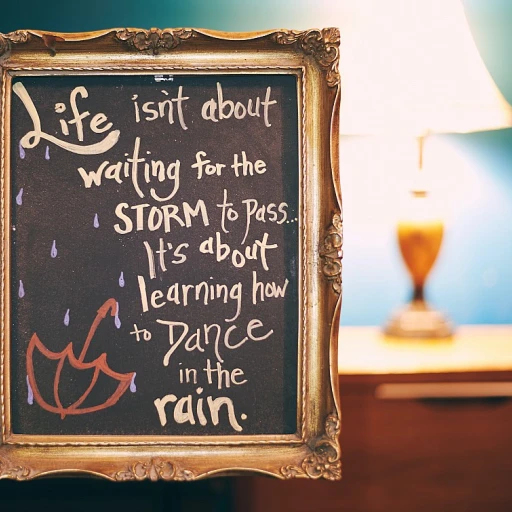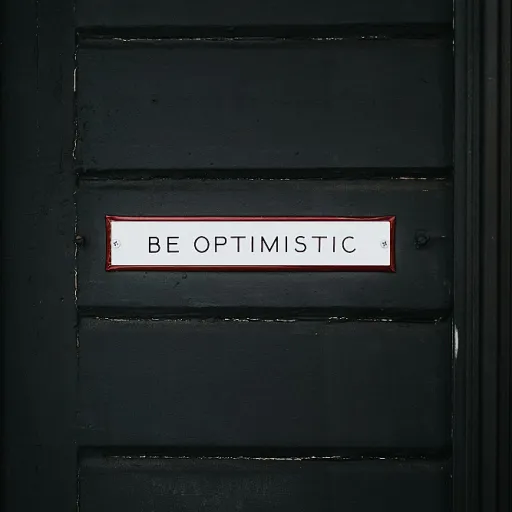
Understanding the Importance of Mindfulness in Work-Life Balance
The Role of Mindfulness Practices in Harmonizing Work and Personal Life
In today's fast-paced world, achieving a harmonious work-life balance can feel like an elusive endeavor. The essence of attaining this balance lies in the practice of mindfulness, which plays a vital role in nurturing both professional and personal growth. As you engage in mindfulness, you're encouraged to stay present, creating a profound connection with each moment.
Mindfulness isn't just about meditation; it's about incorporating certain practices like journaling prompts into your daily routine. These prompts guide you to reflect deeply on your thoughts and feelings, fostering clarity in daily life and offering insight into the small things that often go unnoticed.
Implementing mindfulness journaling into your routine offers a structured space where you can express gratitude and mindfully assess both life's challenges and achievements. This assists in identifying your comfort zone and pushing its boundaries with intention, ultimately leading to positive change.
Moreover, mindfulness in work-life balance isn't just about mental health. It also helps you prioritize tasks, manage time more efficiently, and understand the things and people that truly matter—ultimately enhancing your quality of life. By dedicating intentional time to mindfulness, you're not only adjusting your approach to work but transforming how you experience and feel about life.
For further insights into maintaining a healthy balance, consider exploring a relaxation lounge as a haven for work-life balance, which aligns well with the principles of mindfulness and holistic well-being.
How to Start a Mindfulness Journal
Adopting Mindful Writing Practices
Mindfulness journaling can be an effective way to bring balance into your work-life equation. This practice requires carving out a dedicated space in your day to focus on your thoughts and feelings. The benefits are numerous, but getting started can be a hurdle for many. To begin your mindfulness journaling journey, begin by identifying a time in your daily routine that allows for quiet reflection. This could be in the morning before the chaos of the day erupts or in the evening as things calm down. The key is to find a time where you can be fully present. Find a comforting spot, close your eyes for a moment, and focus on what you are grateful for today. Make it a habit of writing regularly, if not daily. Consistency will help you carve out this productive habit over time. Keeping your journal nearby will serve as a gentle reminder that this time is for you and your personal growth. Start small. You don't need to write a novel each time. Documenting simple thoughts, feelings, or three small things you feel grateful for today can make a big difference in how you proceed with your day. Initially, you may stick to specific prompts, but as you progress, let your thoughts flow naturally on paper. Writing prompts can serve as helpful guides when you're not sure where to start. Some potential ideas include: "Describe a person who inspires you and why," "What are three things you're grateful for today?" or "Write a letter of encouragement to your future self." One of the best aspects of journaling is how it allows you to step out of your comfort zone and explore your deep-seated thoughts. Not only does journaling give structure, but it also fosters a mindset change with each session. For further insights on how mindfulness and purposeful prompts can aid in this personal journey, refer to this comprehensive resource on understanding your life purpose: Uncover Your Life Purpose. Embracing these mindful practices can lead to enriching experiences, helping you maintain balance even during hectic times.Effective Mindfulness Journal Prompts for Work-Life Balance
Journal Writing to Cultivate Balance
Journaling is a powerful tool in helping to restore balance in both personal and professional spheres. When we mindfully write, we create the space to process our thoughts and feelings, which in turn facilitates personal growth and supports mental health. Here are some effective writing prompts that can help you foster work-life balance and navigate daily challenges.- Reflect on Gratitude: Take a moment each day to jot down three small things you are grateful for. It can be as simple as appreciating a person who made you smile or realizing how a small thing in life brings joy. Writing about things you are grateful today can shift your perspective and help you recognize the positives in life.
- Mindful Moments: Identify and describe an experience that made you feel truly present today. Close your eyes and think back to this moment; write down the thoughts and feelings you had. This can be a powerful way to remain grounded and find solace amidst chaos.
- Future Self: Send a message to your future self by writing a letter. Consider what change you want in your life and how you envision your future will unfold. This exercise not only helps with goal setting but also motivates you to step outside your comfort zone.
- Work vs. Life Reflection: Write about a work situation and a life situation that have significantly impacted you. How did they make you feel? Understanding the interplay between work and life experiences sheds light on what truly matters to you.
- Intentions and Goals: Each week, spend time writing down intentions or goals. Be it personal or work-related, this habit fosters accountability and encourages you to strive towards balance.
Incorporating Mindfulness Practices into Your Daily Routine
Bringing Mindfulness to Your Everyday Routine
Integrating mindfulness into your daily life requires a mindful routine that caters to both work and personal growth. By incorporating a few simple practices, you can enhance your mental health and effectively manage your time.
One of the best things you can do is create a dedicated space for mindfulness journaling. This can be a quiet corner of your home or office where you feel at ease and can reflect on your thoughts and feelings. Start by setting aside a few minutes each day to close your eyes and focus on your breath. Allow this to be a moment of calm, helping you transition between work tasks and personal activities.
- Morning Intentions: Begin your day by writing prompts that set intentions for what you wish to achieve. Consider what small things you're grateful for today and what three things you'd like to focus on.
- Midday Check-in: Use your lunch break to reflect on your morning. Write about one thing that brought you joy and how it helped you stay in your comfort zone or push beyond it.
- Evening Reflections: Conclude your day by jotting down your thoughts and feelings. Reflect on the big and small successes, and consider how today's experience will shape your future.
Introducing mindfulness exercises like these into your routine can help you maintain a balanced role between work life and personal mindfulness. Remember that these are flexible guidelines; feel free to adapt them to fit your lifestyle and the things that matter most to you. Even writing things as simple as a letter to yourself about why you are grateful today can have a profound impact on your life.
Overcoming Challenges in Maintaining a Mindfulness Journal
Overcoming Common Hurdles in Mindfulness Journaling
Mindfulness journaling can be a transformative journey, but as with any new practice, it comes with its own set of challenges. Here are some strategies to help you navigate these obstacles and maintain consistency in your journaling habits.- Struggling to Start: If you're finding it hard to make time for mindfulness journaling amidst your busy work and life schedule, try starting with just a few minutes a day. Choose a specific time, such as the start or end of your day, when you feel most relaxed. You can jot down one thing you are grateful for today or one small thing that made you smile. Even writing short, simple entries can help you ease into the practice.
- Lack of Ideas: Writer's block in journaling can be daunting. To overcome this, keep a list of journaling prompts handy. Focus on prompts that encourage you to reflect on your thoughts and feelings or to step out of your comfort zone. You might consider writing a letter to your future self or jotting down your thoughts on a person who influences you positively, explaining why they have such an impact on your life.
- Finding Personal Growth: It can be challenging to see immediate changes in your mental health or work-life balance through journaling. Remember that growth is a gradual process. Reflect on the big three aspects of your life – personal well-being, professional life, and personal relationships – regularly. Observe patterns in your entries across weeks and months to recognize progress.
- Balancing Objectivity and Emotion: While it's essential to allow your thoughts and feelings to flow freely in your journal, maintaining some structure can be beneficial. Consider focusing on specific goals or areas of your life you wish to change or improve. This balance can help you articulate your emotions while keeping a clear focus.
Real-Life Success Stories: Mindfulness and Work-Life Balance
Transformational Journeys: Real-Life Success Stories
Many individuals find themselves on a journey towards improving their work-life balance, and mindfulness journaling has been a powerful catalyst for change. By integrating small things into daily life, people have been able to make colossal shifts in their mental health and personal growth.
Take, for example, a person who was previously overwhelmed by the relentless demands of work. They discovered the value of writing as a means to manage their stress levels. Starting with simple writing prompts, they began to create space each day for reflection, focusing on things they were grateful for today.
With time, this technique helped clarify their thoughts and feelings, allowing them to prioritize what truly mattered. This mental clarity soon translated into more mindful decision-making, both in the office and at home. They noted a significant change in their outlook on life, discovering a newfound sense of balance.
Another individual shared their experience with incorporating journaling prompts into their routine. Initially resistant to the idea, they soon found that closing their eyes and writing from the heart allowed them to tap into their deeper emotions. This practice not only enhanced their self-awareness but also strengthened their relationships, as they became more empathetic and attentive to those around them.
Journaling has been particularly effective in helping people step out of their comfort zones, encouraging them to pursue big changes. This has included setting professional boundaries, exploring new hobbies, and even changing careers. By consistently writing things out, individuals have often reported a marked improvement in their overall life satisfaction.
Ultimately, these stories illustrate that mindfulness journaling is not just about recording thoughts. It is a transformative tool that fosters personal growth and balances ambitions, providing time and space for individuals to reflect, reset, and move forward with intention.













